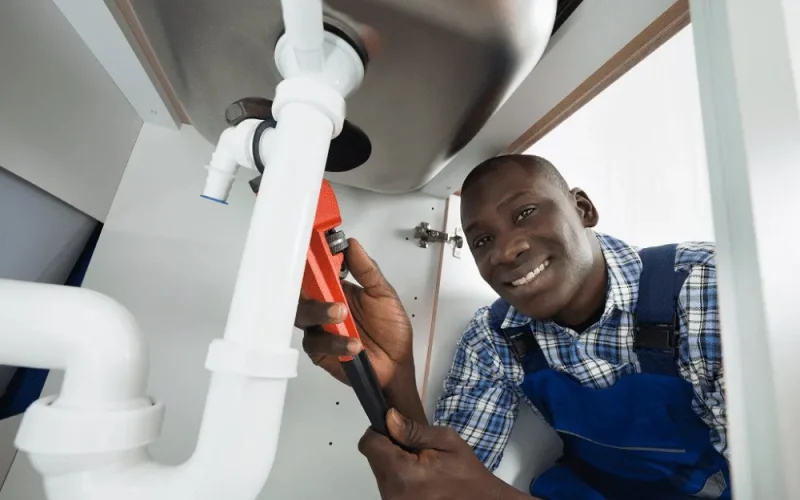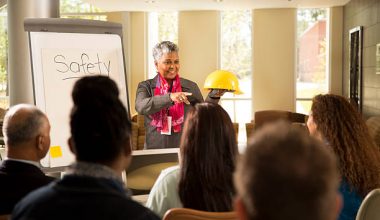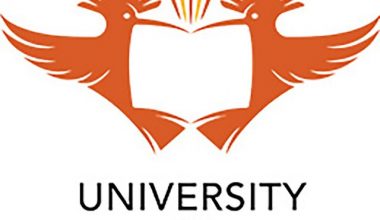Plumbing isn’t just about fixing leaks and unclogging pipes; it’s a skilled trade that keeps homes, businesses, and industries running smoothly. From installing complex water systems to designing drainage plans, plumbing work goes far beyond what most people see.
If you’re considering a career in plumbing, plumbing courses in South Africa can offer you the skills and hands-on experience you need to thrive in this essential field.
In this article, we’ll explore some of the best plumbing courses available in South Africa, covering what each program offers, what you’ll need to get started, and a breakdown of the 2025 fee structure.
Table of contents
- Plumbing in South Africa
- Is Plumbing in demand in South Africa?
- Best Plumbing Courses in South Africa
- 1. National Certificate in Plumbing
- 2. Trade Certificate in Plumbing
- 3. Diploma in Plumbing
- 4. Bachelor of Technology in Plumbing
- 5. Certificate in Plumbing Supervision
- 6. Certificate in Plumbing Design
- 7. Certificate in Green Plumbing
- 8. Certificate in Water Treatment Systems
- 9. Certificate in Solar Water Heating Systems
- 10. Certificate in Rainwater Harvesting Systems
- How long does it take to become a plumber in South Africa?
- Plumbing Courses fees structure in South Africa
- FAQs
- Conclusion
- References
- Recommendations
Plumbing in South Africa
Plumbing in South Africa is a huge deal and offers tons of opportunities. The demand for skilled plumbers is on the rise, especially as more homes, businesses, and big construction projects are built.
And let’s face it, plumbing is one of those things you don’t think about until something goes wrong. But when it does, you need someone who knows exactly what they’re doing.
In South Africa, plumbing is becoming an essential service – not just for fixing leaks. There’s a big need for plumbers who can install and maintain water-saving systems and even work on eco-friendly plumbing projects, which are gaining popularity.
Plus, with water scarcity in some areas, having systems that help save and manage water is crucial.
So, if you’re considering plumbing, it’s a field with steady work and room for growth. Whether you’re looking to become a plumber or invest in plumbing services, South Africa’s plumbing industry is full of potential.
Read: What Are Vocational Courses? 50+ Popular Vocational Courses After 12th and 10th
Is Plumbing in demand in South Africa?
Yes, plumbing is definitely in demand in South Africa. With the country constantly developing, there’s a big need for skilled plumbers. New houses, businesses, and big projects are popping up everywhere, and they all need reliable plumbing.
But it’s not just about new buildings. South Africa also has many older structures, where the plumbing needs regular work and upgrades, so plumbers stay busy with that, too.
Another key thing is water scarcity. People focus on water-saving systems in many areas to help manage and reduce water usage. Skilled plumbers are needed to install and maintain these systems, making the job even more critical.
So, if you’re thinking about plumbing as a career or just curious, it’s safe to say that plumbing work isn’t slowing down in South Africa. The demand is real, and it’s here to stay.
Best Plumbing Courses in South Africa
If you’re searching for some of the best plumbing courses near me in South Africa, here are the top 10 to consider:
- National Certificate in Plumbing
- Trade Certificate in Plumbing
- Diploma in Plumbing
- Bachelor of Technology in Plumbing
- Certificate in Plumbing Supervision
- Certificate in Plumbing Design
- Certificate in Green Plumbing
- Certificate in Water Treatment Systems
- Certificate in Solar Water Heating Systems
- Certificate in Rainwater Harvesting Systems
1. National Certificate in Plumbing
The National Certificate is one of South Africa’s top choices for students diving into the tech world. This course covers essential IT skills, from networking and cybersecurity to software development.
Given the rising demand for tech professionals in South Africa, especially with the growth of online businesses and remote work, this course is a path to a successful career.
Students can expect a mix of theory and hands-on experience, ensuring they’re ready for real-world challenges. Fees vary but typically range from around R15,000 to R30,000, depending on the institution.
Berea Technical College and Academic Institute of Excellence are popular schools offering this course. Both are known for strong tech programs and industry connections.
2. Trade Certificate in Plumbing
The Trade Certificate is another top choice for anyone interested in building a strong tech career in South Africa.
This practical and hands-on course covers areas like software development, networking, and cybersecurity. South Africa has a high demand for IT professionals, so completing this course can open doors to various job opportunities.
Students can expect a mix of classroom learning and real-world projects, helping them gain skills that employers want. The fees vary but generally start around R10,000 and can increase based on the specific modules.
A great place to consider for this course is the University of South Africa (UNISA), known for its flexible programs and solid reputation in tech education. This particular course is known as one of the best UNISA plumbing courses.
Also, read: Top 15 Vocational courses in South Africa | 2025 Fee Structure
3. Diploma in Plumbing
A Diploma in Plumbing is a solid choice if you want to build a steady, hands-on career in South Africa’s growing construction and maintenance industry.
This course covers everything from pipe installation to advanced water systems and safety standards, preparing you for real-world plumbing jobs. And with South Africa’s continuous growth in residential and commercial buildings, skilled plumbers are highly in demand.
During the course, students can expect a blend of classroom learning and practical training, where they’ll get real experience handling tools and solving plumbing challenges. Fees vary, typically around R10,000 to R30,000, depending on the institution.
Northlink College is a great option for this diploma, offering strong training and connections in the industry. If you are interested in a career in plumbing, this diploma could be your first step to success.
4. Bachelor of Technology in Plumbing
A Bachelor of Technology in Plumbing can take your plumbing career to the next level. This course isn’t just about hands-on skills; it dives into advanced topics like plumbing design, system efficiency, and water management, preparing you to tackle complex projects or even move into supervisory roles.
In South Africa, where infrastructure growth and sustainability are hot topics, plumbers with higher qualifications are in demand.
Students in this program can expect a mix of theoretical and practical training, with opportunities to learn about cutting-edge technologies in the field. Tuition costs range widely, starting from around R30,000 per year.
The University of Johannesburg offers this program under its faculty of engineering and the built environment and is known for its high standards and industry connections. If you’re passionate about plumbing and want to make an impact, this degree could be your ideal path forward.
5. Certificate in Plumbing Supervision
A Certificate in Plumbing Supervision is ideal for those looking to step up into a leadership role in the plumbing industry.
This course covers essential skills like project management, safety protocols, and team supervision, helping you transition from hands-on work to overseeing plumbing projects and leading a team.
In South Africa, where construction and maintenance demand continues to grow, there’s a strong need for qualified plumbing supervisors.
Students can expect practical training alongside theory, focusing on understanding plumbing codes and managing job sites. Fees for a course like this generally start at around R8,000.
A great choice for this certification is the Plumbing Academy in South Africa, known for their focus on real-world skills and leadership training. This course could be your pathway to taking on bigger responsibilities and advancing your career in plumbing.
6. Certificate in Plumbing Design
This course alone, a Certificate in Plumbing Design, can open doors if you’re aiming for the technical side of plumbing. It’s perfect for those who want to design systems rather than just install them.
Here, you’ll learn how to create detailed plumbing layouts for buildings, which include drainage, piping, and water supply networks. This skill is in high demand across South Africa, especially with ongoing growth in construction.
You’ll explore topics like hydraulic calculations, materials selection, and environmental standards and gain hands-on experience with design software.
Fees for this course typically start around R10,000, and institutions like the College of Cape Town under its NC (V) Engineering and Related design, offer well-regarded programs focusing on practical and theoretical learning.
With this certificate, you’ll be ready to work alongside architects and engineers, giving you a critical role in building projects.
Read Also: Nosa Courses and Prices in South Africa
7. Certificate in Green Plumbing
Green plumbing means using eco-friendly methods and technologies to save water and reduce energy in plumbing systems. With a Certificate in Green Plumbing, you’ll learn sustainable techniques like rainwater harvesting, efficient water heating, and waste reduction.
This course is in demand in South Africa, where there’s a push to conserve resources in response to climate change and water shortages. It is one of the best online plumbing courses you can take from anywhere.
Expect practical training on using water-efficient fixtures and renewable energy solutions. Fees for this course start around R8,000.
One great option is that although the American Society of Plumbing Engineers and the International Association of Plumbing Engineers offer the course, it can be taken virtually. South Africans can take the course under ASPE Education and get certified.
Completing this certificate gives you the skills to work in residential and commercial spaces, helping clients reduce their environmental footprint while saving on utility bills.
8. Certificate in Water Treatment Systems
Water treatment makes water safe and clean for use, whether for drinking, cooking, or cleaning. This is especially important in South Africa, where many areas face water quality issues.
By taking a Certificate in Water Treatment Systems, you’ll learn how to manage and improve water systems, making a real difference in your community.
This course covers everything from filtration to chemical treatments, so you’ll get a good mix of theory and hands-on practice. Fees usually range around R10,000; a great place to study this is the Technicon SA.
Completing this certificate can lead to jobs in water management or environmental services or even help you start your own business in this essential field.
9. Certificate in Solar Water Heating Systems
Solar water heating systems use the sun’s energy to heat water for homes and businesses, offering a sustainable and cost-effective way to reduce electricity bills. With South Africa’s abundant sunshine, this technology has high demand, especially as people look to save on energy costs.
A Certificate in Solar Water Heating Systems will teach you how to install, maintain, and troubleshoot these systems, making you a valuable player in the green energy sector. You’ll dive into practical skills, learning about solar panels, heat storage, and energy transfer.
Fees typically range around R8,000–R12,000, and the South African Qualifications Authority (SAQA) is one school where you can take this course. With these skills, you’ll be equipped to work on projects that help communities save money and protect the environment.
10. Certificate in Rainwater Harvesting Systems
Rainwater harvesting systems capture and store rainwater for household or commercial use, an increasingly vital approach as South Africa faces ongoing water challenges.
Jobs in this field include setting up collection tanks, filtration, and distribution systems, making this skill highly sought after in both urban and rural areas.
A Certificate in Rainwater Harvesting will give you practical, hands-on skills to design and maintain these systems. Students learn to assess a property’s needs, install pipes and tanks, and set up filtration methods to ensure water quality.
The fees for this course are generally around R7,500–R10,000, and the Centre for Science and Environment offers a robust program in this field. Once certified, you’ll be prepared to enter a growing industry about sustainability and providing reliable water solutions.
How long does it take to become a plumber in South Africa?
It takes about four years to become a certified plumber in South Africa. This isn’t just about learning in a classroom—you’ll be doing a plumbing apprenticeship, a mix of hands-on training and classes.
Technical colleges or trade schools offer these programs, and during those four years, you’ll build the skills needed to handle real plumbing work confidently.
You’ll learn everything from installing pipes and fixtures to understanding drainage and water systems. By the end, you’ll have the practical experience and the knowledge to become a fully certified plumber, ready for a rewarding career.
Read Also: Top 15 Best Bridging Courses in South Africa
Plumbing Courses fees structure in South Africa
Plumbing courses prices in Africa vary because these courses in South Africa come in different levels, and the fees can vary depending on how advanced the course is.
Expect to pay around R7,500 for a basic short course, which usually lasts about four weeks. You’ll need to bring a copy of your ID or passport, two ID photos, some essentials like a blanket and clothes, and some extra money for food and PPE (Personal Protective Equipment). Completing this course will earn you a plumbing certificate.
If you’re interested in going further, you can look into higher certificates or diplomas, which cost more but cover deeper skills and can last several months. The fees increase quite a bit for advanced training or a complete plumbing degree but open up even more job opportunities.
This range of options means there’s something for everyone, whether you’re looking to gain some basic skills or aiming for a full career in plumbing.
FAQs
Plumbers in South Africa register with the Plumbing Industry Registration Board (PIRB). This board ensures that plumbers meet national standards and are qualified, maintaining the profession’s credibility and protecting customer safety.
A plumbing certificate is required in South Africa to ensure compliance with industry standards and maintain public safety.
You’ll need math, science, and technical skills to become a plumber in South Africa. Courses often cover physics, design, and practical plumbing training basics.
Conclusion
South African plumbing courses provide the ideal foundation for anyone aiming to build a solid career in this essential industry. From practical skills to certification pathways, these programs set you up for success. As demand grows, certified plumbers in South Africa are positioned for stability and opportunity. Start exploring plumbing courses in South Africa and take the first step toward a rewarding, hands-on career.
References
- coursetakers.com – PLUMBING COURSES IN CAPE TOWN, SOUTH AFRICA
- ohstrainings.co.za – Plumbing Training in South Africa






